Dementia Researcher Blogs
The Dementia Researcher Blogs Podcasts - through this show, you can hear our bloggers read their blogs. So if you prefer to read, you can head or our website or you can listen on the move. These shows are about academic / research careers, research, science and life as an early career dementia researchers. Brought to you by https://www.dementiaresearcher.nihr.ac.uk - everything you need, all in one place. Remember to subscribe to our main ‘Dementia Researcher‘ Podcast, here and where ever you get your podcasts.
The Dementia Researcher Blogs Podcasts - through this show, you can hear our bloggers read their blogs. So if you prefer to read, you can head or our website or you can listen on the move. These shows are about academic / research careers, research, science and life as an early career dementia researchers. Brought to you by https://www.dementiaresearcher.nihr.ac.uk - everything you need, all in one place. Remember to subscribe to our main ‘Dementia Researcher‘ Podcast, here and where ever you get your podcasts.
Episodes
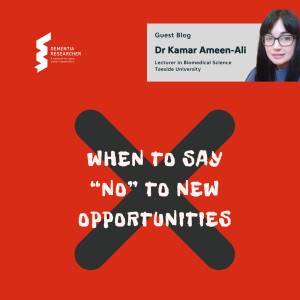
Thursday Jan 11, 2024
Dr Kamar Ameen-Ali - When to say “no” to new opportunities
Thursday Jan 11, 2024
Thursday Jan 11, 2024
Dr Kamar Ameen-Ali narrates her blog written for Dementia Researcher.
In this blog Kamar explores the delicate balance between seizing opportunities and setting boundaries. Discover her journey from a PhD student to a lecturer, and learn the art of saying "no" to opportunities that don't align with personal and professional growth. This blog offers a unique perspective on managing workload and avoiding burnout in academia, emphasising the importance of strategic decision-making. An essential read, with lessons for academics at any stage of their career.
Find the original text, and narration here on our website.
https://www.dementiaresearcher.nihr.ac.uk/blog-when-to-say-no-to-new-opportunities/
--
Dr Kamar Ameen-Ali is a Lecturer in Biomedical Science at Teesside University & Affiliate Researcher at Glasgow University. In addition to teaching, Kamar is exploring how neuroinflammation following traumatic brain injury contributes to the progression of neurodegenerative diseases that lead to dementia. Having first pursued a career as an NHS Psychologist, Kamar went back to University in Durham to look at rodent behavioural tasks to completed her PhD, and then worked as a regional Programme Manager for NC3Rs.
--
Enjoy listening? We're always looking for new bloggers, drop us a line. http://www.dementiaresearcher.nihr.ac.uk
This podcast is brought to you in association with Alzheimer's Association, Alzheimer's Research UK, Alzheimer's Society and Race Against Dementia, who we thank for their ongoing support.
--
Follow us on Social Media:
https://www.instagram.com/dementia_researcher/
https://www.facebook.com/Dementia.Researcher/
https://twitter.com/demrescommunity
https://bsky.app/profile/dementiaresearcher.bsky.social
https://www.linkedin.com/company/dementia-researcher
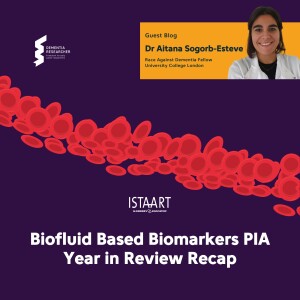
Wednesday Jan 10, 2024
Dr Aitana Sogorb-Esteve - Biofluid-based biomarkers PIA Year in Review Recap
Wednesday Jan 10, 2024
Wednesday Jan 10, 2024
Dr Aitana Sogorb-Esteve, narrating her blog written for the Dementia Researcher website.
In this blog Aitana explores the latest advancements in biofluid-based biomarkers for dementia research, sharing highlights from the recent ISTAART Biofluid Based Biomarkers PIA Year in Review Meeting. The 2023 highlights include detailed discussions on proteomics, plasma biomarkers, and innovative protein assays relevant to Parkinson’s and frontotemporal dementia. Learn about the advancements in blood-based biomarkers, remote testing technologies, and non-Alzheimer's dementias. Keep abreast of the evolving landscape of dementia research and the anticipated developments for 2024.
Find the original text, and narration here on our website.
https://www.dementiaresearcher.nihr.ac.uk/blog-biofluid-based-biomarkers-pia-year-in-review-recap/
--
Dr Aitana Sogorb-Esteve is a Race Against Dementia Research Fellow based in the Dementia Research Centre at University College London. Sitana works on the fluid biomarker team of Dr. Jonathan Rohrer group. Her work focusses on finding novel fluid biomarkers to assess cellular dysfunction in genetic FTD. She is particulary looking for fluid biomarkers of synaptic dysfunction in genetic FTD, aiming to develop a technique for measuring these synaptic markers in blood.
--
Enjoy listening? We're always looking for new bloggers, drop us a line. http://www.dementiaresearcher.nihr.ac.uk
This podcast is brought to you in association with Alzheimer's Association, Alzheimer's Research UK, Alzheimer's Society and Race Against Dementia, who we thank for their ongoing support.
--
The Year in Review Webinars are being held throughout January 2024, to attend and find out more visit:
https://www.dementiaresearcher.nihr.ac.uk/support-resources/alzheimers-association/
--
Follow us on Social Media:
https://www.instagram.com/dementia_researcher/
https://www.facebook.com/Dementia.Researcher/
https://twitter.com/demrescommunity
https://bsky.app/profile/dementiaresearcher.bsky.social
https://www.linkedin.com/company/dementia-researcher
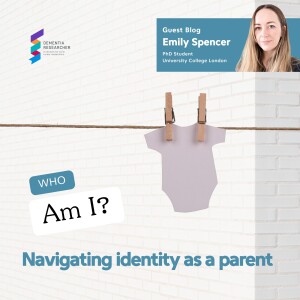
Thursday Jan 04, 2024
Emily Spencer - Who am I? Navigating identity as a parent
Thursday Jan 04, 2024
Thursday Jan 04, 2024
Emily Spencer, narrating her blog written for the Dementia Researcher website.
Join Emily, a PhD student and new mother, in her compelling blog. In this insightful piece, she shares her unique experience of balancing doctoral research in dementia with the joys and challenges of motherhood. Emily candidly addresses the complexities of gendered expectations and the evolution of her identity, offering a fresh perspective on managing personal and professional roles. Her honest narrative is not just inspiring but also a must-read for anyone striving to harmonise their career and family life.
Find the original text, and narration here on our website.
https://www.dementiaresearcher.nihr.ac.uk/blog-who-am-i-navigating-identity-as-a-parent/
--
Emily Spencer is a PhD Student at University College London looking at improving how GPs communicate with people with dementia and their family carers about their future care. Emily previous had a 5 year career break to pursue a career as a musician, and has previously undertaken research on improving the care people with dementia receive from their GP practice, as well as end-of-life and palliative care provision in the community. Emily is also a new mum and will be writing about her experiences navigating motherhood and a research career.
--
Enjoy listening? We're always looking for new bloggers, drop us a line. http://www.dementiaresearcher.nihr.ac.uk
This podcast is brought to you in association with Alzheimer's Association, Alzheimer's Research UK, Alzheimer's Society and Race Against Dementia, who we thank for their ongoing support.
--
Follow us on Social Media:
https://www.instagram.com/dementia_researcher/
https://www.facebook.com/Dementia.Researcher/
https://twitter.com/demrescommunity
https://bsky.app/profile/dementiaresearcher.bsky.social
https://www.linkedin.com/company/dementia-researcher
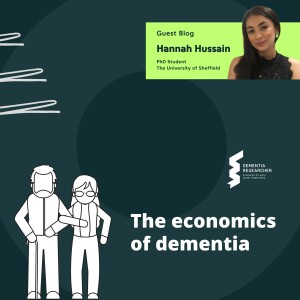
Monday Jan 01, 2024
Hannah Hussain - The Economics of Dementia
Monday Jan 01, 2024
Monday Jan 01, 2024
Hannah Hussain narrates her blog written for Dementia Researcher.
Explore the crucial intersection of economics and dementia in Hannah's insightful blog, "The Economics of Dementia." As a PhD student at The University of Sheffield, Hannah explores the escalating costs associated with dementia in the UK, projected to soar from £25 billion in 2021 to an astonishing £47 billion by 2050.
This blog goes beyond mere statistics, offering a comprehensive understanding of what these figures truly represent. Hannah unpacks the complexity of both direct and indirect costs linked to dementia, from healthcare expenses to the often-overlooked impact on caregivers and society at large. With a focus on current government spending, the role of research and innovation, and the future outlook, this blog is a must-read for anyone interested in the economic implications of dementia on individuals, the NHS, and the broader society. This blog illuminates the path towards better resource allocation, policy development, and ultimately, improved quality of life for those affected by dementia.
Find the original text, and narration here on our website.
https://www.dementiaresearcher.nihr.ac.uk/blog-the-economics-of-dementia/
--
Hannah Hussain is a PhD Student in Health Economics at The University of Sheffield. As a proud third generation migrant and British-Asian, her career path has been linear and ever evolving, originally qualifying as a Pharmacist in Nottingham, then Health Economics in Birmingham. Her studies have opened a world into Psychology, Mental Health and other areas of health, and with that and personal influences she found her passion for dementia.
--
This podcast is brought to you in association with Alzheimer's Association, Alzheimer's Research UK, Alzheimer's Society and Race Against Dementia, who we thank for their ongoing support.
Enjoy listening? We're always looking for new bloggers, drop us a line dementiaresearcher@ucl.ac.uk
--
Follow us on Social Media:
https://www.instagram.com/dementia_researcher/
https://www.facebook.com/Dementia.Researcher/
https://twitter.com/demrescommunity
https://bsky.app/profile/dementiaresearcher.bsky.social
https://www.linkedin.com/company/dementia-researcher

Thursday Dec 21, 2023
Rebecca Williams - MEGry Christmas to All!
Thursday Dec 21, 2023
Thursday Dec 21, 2023
Rebecca Williams, narrates her blog written for the Dementia Researcher website.
Experience the magic of neuroscience this holiday season with Rebecca's blog. In a heartwarming tale set against the backdrop of Christmas morning, discover the fascinating world of Magnetoencephalography, or MEG, as it unveils the secrets of the brain's inner workings. Join the journey as Rebecca takes you through the challenges and wonders of neuroscience, where magnetic fields, superconducting quantum interference devices (SQUIDs), and optically pumped magnetometers (OPMs) are the stars of the show. While Santa may not be delivering a million-pound MEG scanner down the chimney, OPMs offer a promising future, bringing us one step closer to understanding the brain's mysteries with their portability and sensitivity. This holiday season, unwrap the gift of knowledge and explore the exciting possibilities of neuroimaging. MEGry Christmas to all, and to all a good night!
Find the original text, and narration here on our website.
https://www.dementiaresearcher.nihr.ac.uk/blog-megry-christmas-to-all/
--
Rebecca Williams is PhD student at the University of Cambridge. Though originally from ‘up North’ in a small town called Leigh, she did her undergraduate and masters at the University of Oxford before defecting to Cambridge for her doctorate researching Frontotemporal dementia and Apathy. She now spends her days collecting data from wonderful volunteers, and coding. Outside work, she plays board games, and is very crafty. @beccasue99
--
Enjoy listening? We're always looking for new bloggers, drop us a line. http://www.dementiaresearcher.nihr.ac.uk
This podcast is brought to you in association with Alzheimer's Association, Alzheimer's Research UK, Alzheimer's Society and Race Against Dementia, who we thank for their ongoing support.
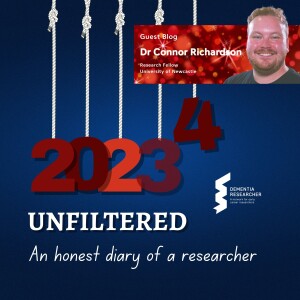
Tuesday Dec 19, 2023
Dr Connor Richardson - 2023 Unfiltered: An honest diary of a researcher
Tuesday Dec 19, 2023
Tuesday Dec 19, 2023
Dr Connor Richardson narrates his blog written for Dementia Researcher.
In this blog, Connor shares his eventful year in dementia research at Newcastle. Highlighting his professional journey, he reflects on securing an NIHR Fellowship, contributing to important publications, and engaging in global conferences like #AAIC23 in Amsterdam. Amidst these achievements, Connor also opens up about personal challenges, from an unsuccessful promotion bid to adapting to changes in his mentorship and personal life. His honest account provides a rare glimpse into the highs and lows of a researcher's life, illustrating resilience and the impact of personal experiences on professional growth. Join Connor as he navigates the intricate balance between career success and personal setbacks in the dynamic field of dementia research.
Find the original text, and narration here on our website.
https://www.dementiaresearcher.nihr.ac.uk/blog-2023-unfiltered-an-honest-diary-of-a-researcher/
--
Dr Connor Richardson is a Neuro-epidemiology Research Associate (soon to be NIHR Research Fellow) in the Newcastle University Population Health Sciences Institute. Connor is the research statistician for the Cognitive Function and Ageing studies (CFAS) multi-centre population cohort. His research interest lies in using advanced statistical modelling and machine learning to measure dementia risk. Connor blogs about his research, Equality, Diversity and Inclusion and sometimes his Pomapoo’s.
--
Enjoy listening? We're always looking for new bloggers, drop us a line. http://www.dementiaresearcher.nihr.ac.uk
This podcast is brought to you in association with Alzheimer's Association, Alzheimer's Research UK, Alzheimer's Society and Race Against Dementia, who we thank for their ongoing support.
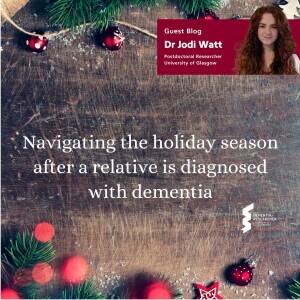
Monday Dec 18, 2023
Monday Dec 18, 2023
Dr Jodi Watt, narrating a new blog they wrote for the Dementia Researcher website.
Jodi shares personal experiences and practical advice on navigating the holiday season after a family member is diagnosed with dementia. Reflecting on cherished traditions with their gran in Scotland, Jodi highlights the profound impact of dementia on family celebrations. They offer thoughtful strategies to adapt and maintain holiday joy, emphasising the importance of simplicity, flexibility, and inclusivity. Jodi's journey through changing holiday landscapes with their gran offers guidance, hope and support for those facing similar challenges.
Find the original text, and narration here on our website.
https://www.dementiaresearcher.nihr.ac.uk/blog-navigating-the-holidays-after-a-relative-is-diagnosed-with-dementia/
--
Dr Jodi Watt is a Postdoctoral Researcher at University of Glasgow. Jodi's academic interests are in both healthy ageing and neurodegenerative diseases of older age, and they are currently working on drug repurposing for dementia. Previously they worked on understanding structural, metabolic and physiological brain changes with age, as measured using magnetic resonance imaging. As a queer and neurodiverse person, Jodi is also incredibly interested in improving diversity and inclusion practices both within and outside of the academic context.
--
Enjoy listening? We're always looking for new bloggers, drop us a line. http://www.dementiaresearcher.nihr.ac.uk
This podcast is brought to you in association with Alzheimer's Association, Alzheimer's Research UK, Alzheimer's Society and Race Against Dementia, who we thank for their ongoing support.
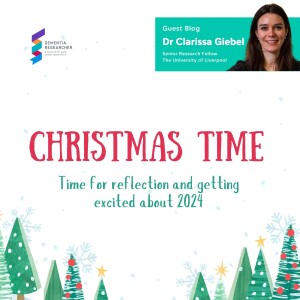
Monday Dec 18, 2023
Monday Dec 18, 2023
Dr Clarissa Giebel narrates her blog written for Dementia Researcher.
Clarissa invites listeners into a world of festive tranquility and thoughtful retrospection. She beautifully intertwines her personal experiences, from decorating with Manchester Christmas Markets mugs to recalling her extensive travels and professional accomplishments. Clarissa's narrative transcends the ordinary, detailing her adventures in global research collaborations and her academic ventures, including the creation of a unique board game. As she reflects on the bustling year, filled with both successes and challenges, she emphasises the importance of taking a moment to appreciate the journey and the lessons learned. The blog is not just a recount of the past year’s achievements and travels; it's an inspiring message to embrace the festive season's calm, indulge in Christmas biscuits, and look forward to the promising horizons of 2024. Clarissa's blend of professional insight and personal anecdotes culminates in a warm, festive greeting, encouraging readers to celebrate their own achievements and anticipate the new year with hope and excitement.
Find the original text, and narration here on our website.
https://www.dementiaresearcher.nihr.ac.uk/blog-christmas-a-time-for-reflection-and-getting-excited-about-2024/
--
Dr Clarissa Giebel is a Senior Research Fellow at the University of Liverpool and NIHR ARC North West Coast. Clarissa has been working in dementia care research for over 10 years focusing her research on helping people with dementia to live at home independently and well for longer, addressing inequalities that people with dementia and carers can face. Outside of her day work, Clarissa has also organised a local dementia network - the Liverpool Dementia & Ageing Research Forum, and has recently started her own podcast called the Ageing Scientist.
--
If you would like to write your own blog drop us a line, we're always on the look out for new contributors to write about their research, careers + more dementiaresearcher@ucl.ac.uk
This podcast is brought to you in association with Alzheimer's Association, Alzheimer's Research UK, Alzheimer's Society and Race Against Dementia, who we thank for their ongoing support.
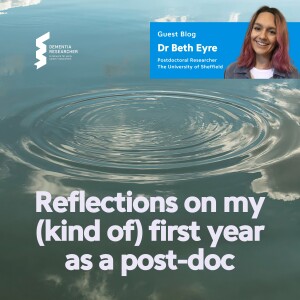
Wednesday Dec 13, 2023
Beth Eyre - Reflections on my (kind of) first year as a post-doc
Wednesday Dec 13, 2023
Wednesday Dec 13, 2023
Beth Eyre narrates her blog written for Dementia Researcher.
Beth reflects on her nearly one-year experience as a post-doc, highlighting the lack of control in research projects, the significant responsibilities of the role, the never-ending tasks, the importance of time management, and the constant uncertainty of what's next in an academic career.... Sound familiar? She acknowledges the dynamic nature of science and the need to adapt to changing priorities and circumstances, ultimately emphasising the uniqueness of each individual's journey in academia.
Find the original text, and narration here on our website.
https://www.dementiaresearcher.nihr.ac.uk/blog-reflections-on-my-kind-of-first-year-as-a-post-doc/
--
Dr (pending minor amendments) Beth Eyre is a Postdoctoral Researcher at The University of Sheffield, researching Neurovascular and cognitive function in preclinical models of Alzheimer’s disease. Beth has a background in psychology, where she gained her degree from the University of Leeds. Inside and outside the lab, Beth loves sharing her science and in her blogs, she discusses her work, career and shares lessons she learns as she navigates life as an early career researcher.
--
This podcast is brought to you in association with Alzheimer's Association, Alzheimer's Research UK, Alzheimer's Society and Race Against Dementia, who we thank for their ongoing support. Enjoy listening? We're always on the look out for new contributors, if you would like to write and narrate your own blog - drop us a line dementiaresearcher@ucl.ac.uk.
Don't forget to also listen to our fortnightly podcast, just look for Dementia Researcher in your podcast app.





